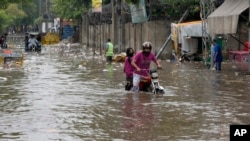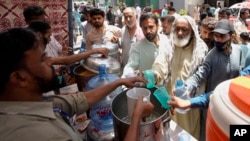A new study has revealed that recent floods in Pakistan have substantially weakened its societal resilience in coping with and recovering from such disasters as the threat from climate change continues to grow.
The London-headquartered independent global charity Lloyd’s Register Foundation said Tuesday the findings are part of the latest edition of their flagship World Risk Poll Resilience Index.
The study also highlighted that the number of Pakistanis who have experienced a disaster in the past five years has more than doubled since 2021, increasing from 11% to 27%.
“This increase has been driven primarily by the extensive floods that hit the country in 2022, affecting regions containing around 15% of the population,” the study said.
The report noted that community and society resilience scores declined sharply in the regions most affected by the floods, particularly in the southern Sindh province.
“These scores declined because people reported losing confidence in the support of the government, community and infrastructure — at a national level, those who said their government cared ‘not at all’ about them and their well-being rose from 60% in 2021 to almost three-quarters [72%] in 2023.”
Meanwhile, the country's already low individual and household resilience levels failed to improve, with Pakistan ranking in the bottom 10 globally for both resilience scores, according to the report.
Nancy Hey, the director of evidence and insight at Lloyd’s Register Foundation, urged policymakers in Pakistan to prioritize rebuilding and strengthening the resilience of the most affected communities.
She said this would better prepare them to face natural hazards and other potential causes of disasters in the wake of the growing threat of climate change.
“For residents of Pakistan, catastrophic flooding is largely responsible for the doubling in disaster experience since 2021. This may have led to a ‘reality check’ for residents in terms of how prepared they feel for such events, with community and societal resilience particularly negatively affected,” Hey said.
In 2022, Pakistan’s southern and southwestern regions experienced devastating floods triggered by climate change-induced unusually heavy monsoon rains, killing more than 1,700 people, affecting 33 million others, and submerging approximately one-third of Pakistan.
The South Asian nation of about 245 million contributes less than 1% to global carbon emissions but bears the brunt of climate change.
The country’s weather patterns have changed dramatically in recent years, and it officially “ranks fifth among the countries most affected by global warming.”
April was recorded as the wettest month in Pakistan since 1961, with more than double the usual monthly rainfall, killing scores of people and destroying property as well as farmland.
In May and June, Pakistan experienced relatively hotter heat waves, with temperatures in some districts rising to more than 52 degrees Celsius for days. The hot weather prompted authorities in May to temporarily shut down education for half of Pakistan's schoolchildren to protect them from heatstroke and dehydration.
The United Nations has warned that an estimated 200,000 Pakistanis could be affected by the coming monsoon season and flash floods, as national weather forecasters project above-normal rainfall.
Prime Minister Shehbaz Sharif reviewed preparations for the monsoon season at a special meeting Tuesday and formed “a high-level committee” to handle potential emergencies, his office said in a statement.
National Disaster Management Authority officials told the meeting that all relevant institutions and Pakistani troops remain on “high alert” in vulnerable districts. They were quoted as saying that “adequate stocks” of boats, tents, drainage pumps, medicines and other essential items were available for people in areas prone to rain-related disasters.”













